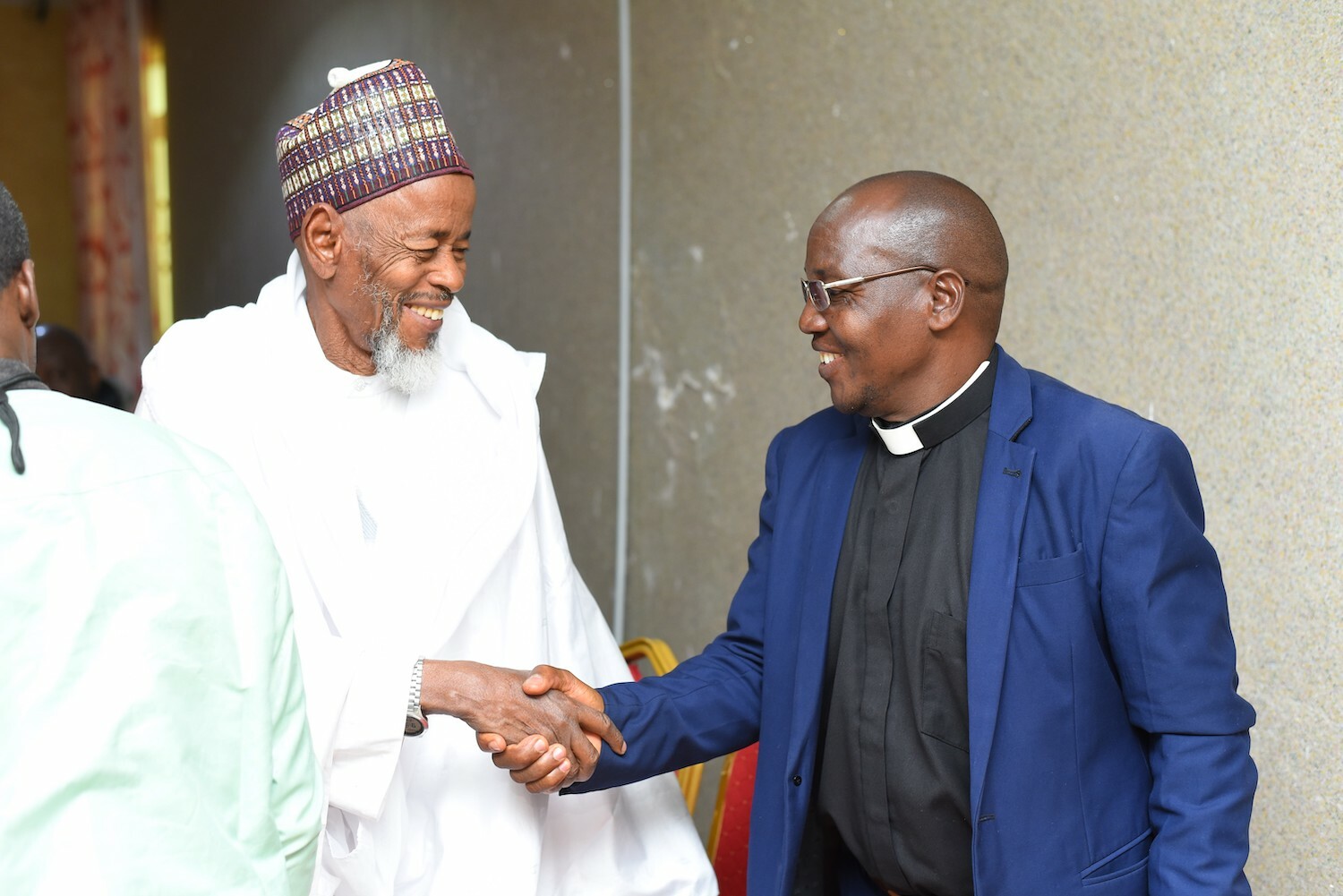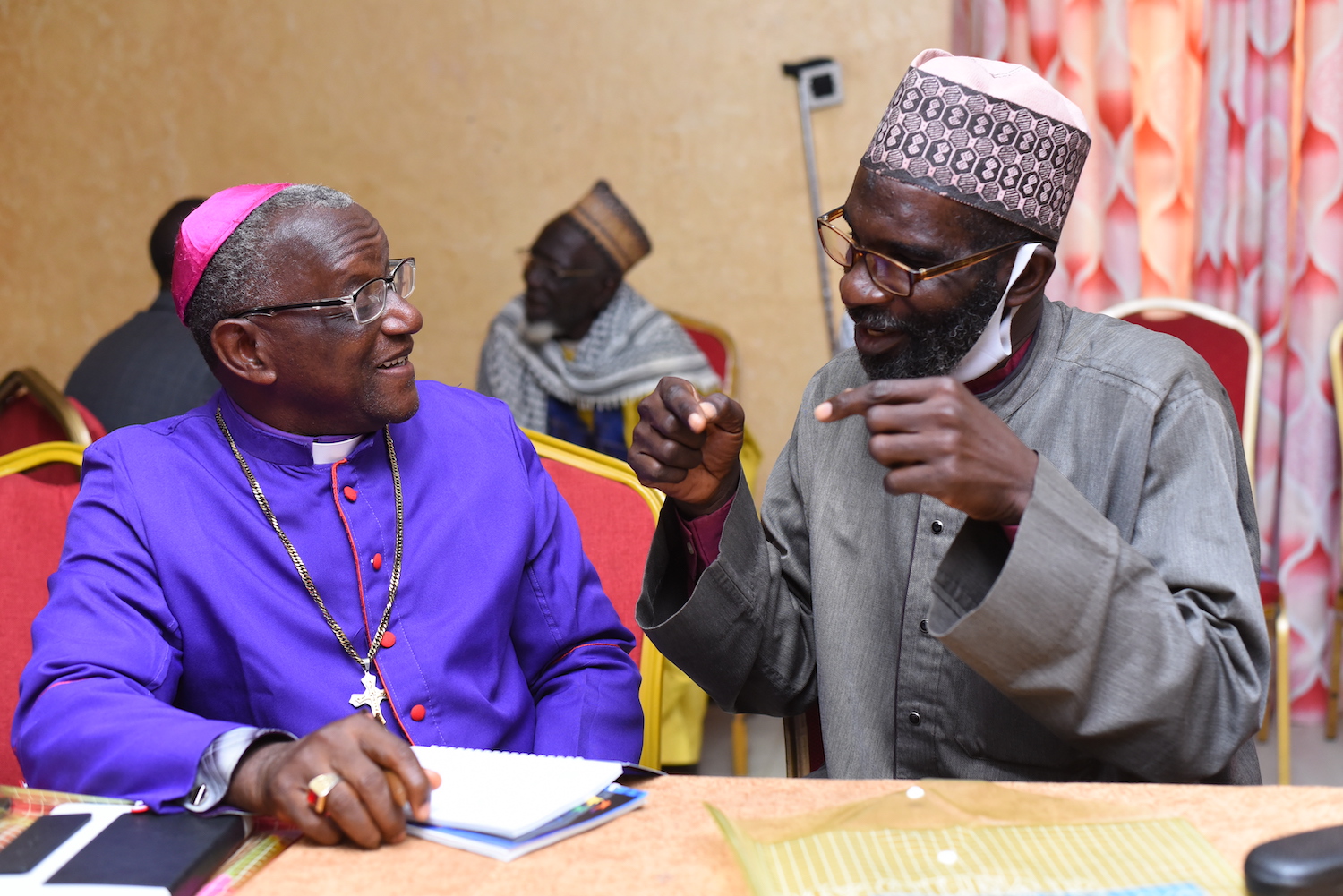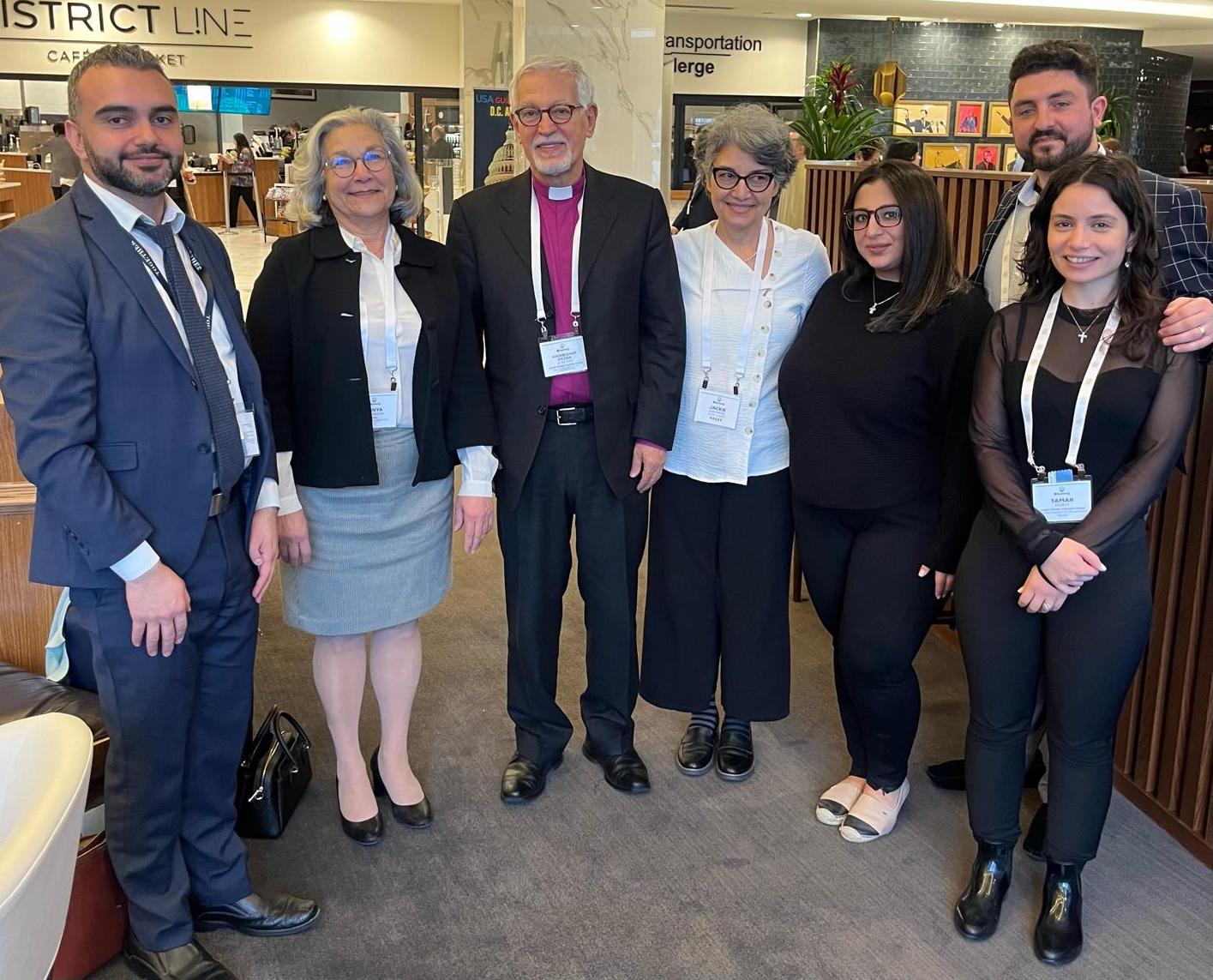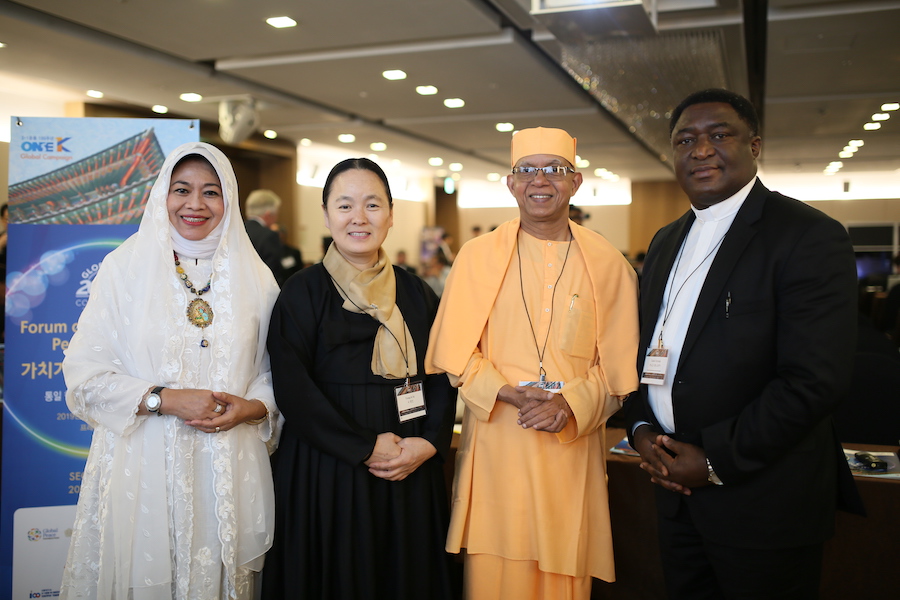
From left: Dr. Siti Musdah Mulia, Young-In Sa, Swami Shantatmananda, Rev. Canice Chinyeaka Enyiaka
The Global Peace Convention Values-based Peacebuilding sessions explored peacebuilding principles and their applications in different contexts around the world. With a wide-spectrum of experts involved in different fields from Korea and abroad, speakers shared insights, wisdom and lessons learned from the field on solving identity-based conflicts and on building communities of peace and shared prosperity.
The sessions and discussions that followed served to underscore the paramount importance of applying universal principles to strategies, policies and local programs in ways that expand human dignity, rights, religious freedom and equitable development for all people.
Living Our Shared Identity: Building Social Cohesion Through Shared Values
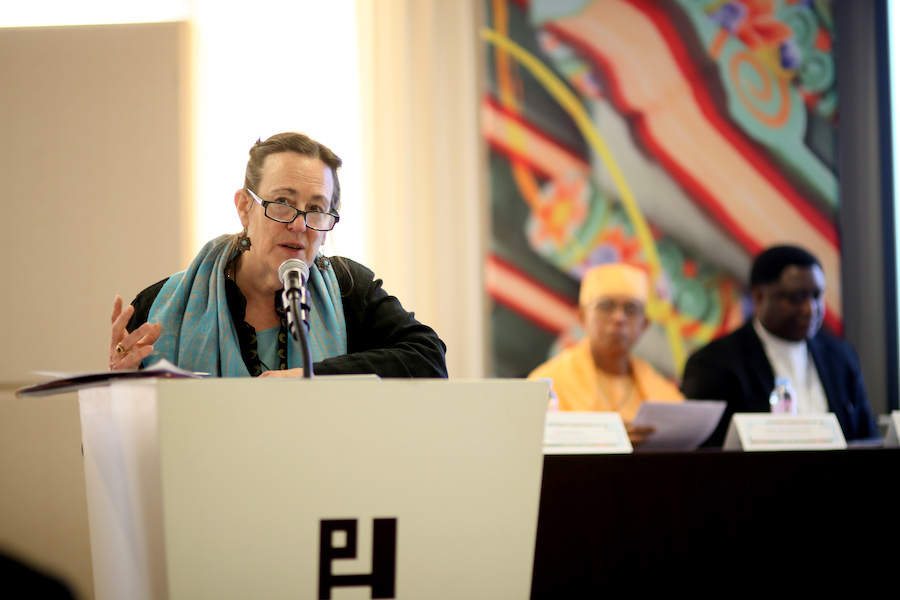
Gail Hambleton, Senior Program Specialist in Interreligious and Community Peacebuilding for Global Peace Foundation
The first session of the Values-based Peacebuilding track focused on practical models that utilized shared values as a way to build social cohesion between diverse groups. Moderator Gail Hambleton of the Global Peace Foundation opened the session by emphasizing a sense of our common origin, shared humanity and the universal principles that can be the basis of building global peace.
Among the speakers, Swami Shantatmanada, Secretary of the Ramakrishna Mission in Delhi, India supported the idea of interreligious, spiritual leaders in leading their respective communities in this kind of inclusive, peacebuilding mentality. Touching on India’s national philosophy, Vasudhaiva Kutumbakam (the world is one family), he commented on the positive social impact that faith communities tend to contribute to society through philanthropy and charitable initiatives. He encouraged interreligious leaders to leverage this kind of impact by working together “to bring people back to spirituality whereby we can create a common ground for ushering in peace and harmony.”
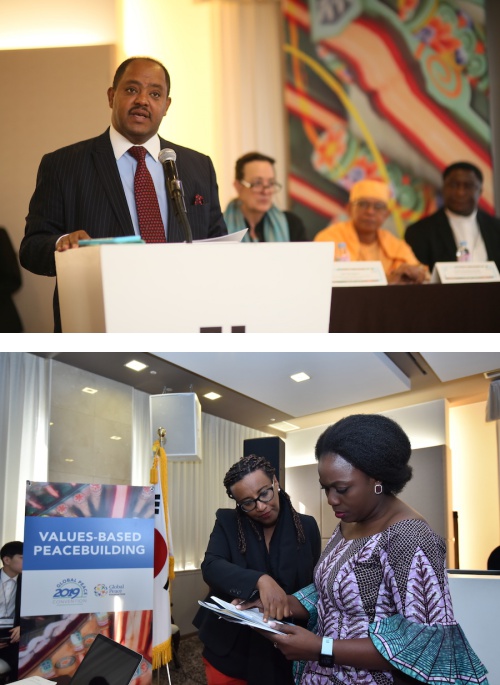
Above: Ambassador Mussie Hailu Gebretsadik; below: Martha Nghambi at the Values-Based Peacebuilding session at GPC 2019
Similarly, Dr. Siti Musdah Mulia of Indonesia highlighted the interconnected principles that form the basis of Indonesian democracy called Pancasila (five principles). Pancasila principles, including the belief in one Creator of all humanity and the unity of the nation, are not simply a matter of government control; Pancasila forms the basis for the freedoms and rights of the people of the nation.
Ambassador Mussie Hailu Gebratsadik of the United Religions Initiative expressed support for an approach that calls for civil society engagement on the everyday, every person, every place level in what might be called “everyday peacebuilding.” He commented, “I do not believe that the task of creating world peace should be left to either the United Nations or governments alone. Each and every one of us should be also a stakeholder for peace to prevail on Earth and need to work together as Citizens of the World.”
Building on the vision that all humanity shares a common heritage, Rev. Canice Chinyeaka Enyiaka, GPF Special Advisor for Africa-Peacebuilding, shared the story of a soccer team from Thailand that was trapped underground for 18 days. “It was as if the whole world came to a stop,” he said. News outlets and the world didn’t care what their religion or race was; they just wanted to save them. “Humanity was trapped in that cave; not just twelve boys from Thailand.”
Preventing Violent Extremism: Best Practices and Community-Driven Models
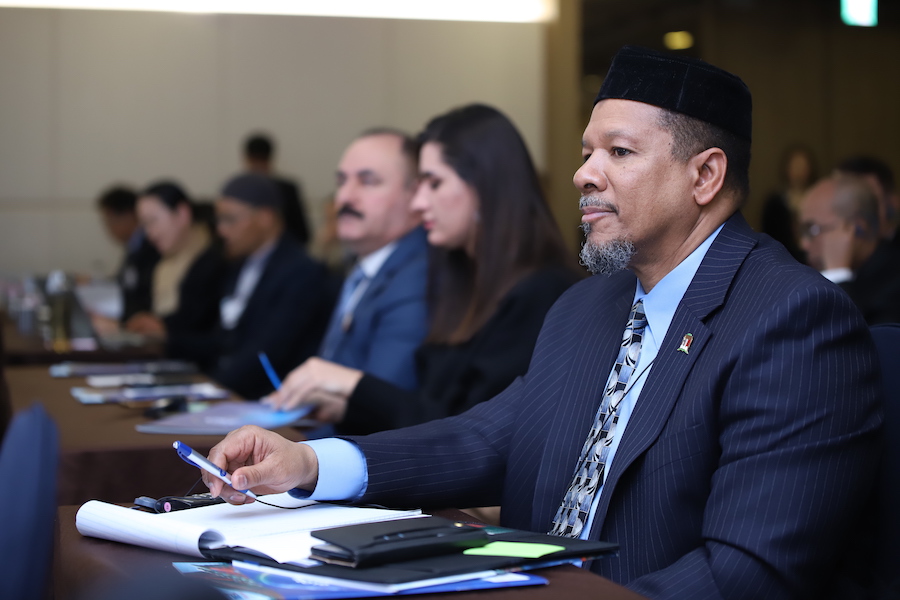
Imam Talib Shareef next to fellow participants at the GPC 2019.
Session Two of the Values-based Peacebuilding Track focused on the highly visible and relevant topic of extremism. Building on insights from the previous session, speakers spoke to approaches that utilize knowledge of our shared identity to approach extremism—particularly religious extremism—in new and creative ways. By pointing first to our common humanity and shared spiritual nature, panelists explored new ways to counter radicalization in practical, actionable community-building strategies through strengthening local community partnerships.
From the frontlines of building community models of social cohesion in settings that range from the United States, Zanzibar and Indonesia, experts and peace practitioners in this session drew attention to resources and preventative narratives shown to counter violent extremist messaging while demonstrating the importance of building trust in and between communities.
Martha Nghambi, GPF Tanzania Director, moderated the session, explaining a “vision of global peace” based upon an acknowledgement that all humanity possesses “a common essence and heritage.” She encouraged that instead of becoming a basis for further division, spiritual leaders could play an important role in bringing people together, noting, “No one is born an extremist. Young people must preach peace for the future.”

From left: Syafiq Mughni, H.E. Dr. Amani Abeid Karume, and Camlus Ouma Omogo
Dr. Syafiq Mughni, Special Envoy of the President of Indonesia on Interfaith Dialogue emphasized that “community participation is a key to building mutual trust, intergroup bridging and social integration.” He cautioned the use of traditional counter-radicalization efforts that attempted to utilize spiritual leadership that might eventually backfire in creating more hostility and discomfort among community members. Rather he encouraged the use of a “community-based peacebuilding approaches [that] rest on empathy, trust, love, and hope.” He noted:
In a community-based approach, total community participation is important. The scale of the program is long term, where the community is involved in formulating problem-solving strategies based on their local capacity. Social capital and local wisdom, including the role of religion, gained an important position in the strategies development. Community-based peacebuilding strategies have always sought to mobilize communities to restore religion from its manipulation to provoke conflict and violence into their role in provoking peace. It is an art of community-based peace management. An art of managing religious identity as a tool to fight against violent provocations. For that reason, we must engage in working with the community and the religious community.
H.E. Dr. Amani Abeid Karume, the former President of Zanzibar, spoke from his experience of addressing and preventing violent extremism in Zanzibar, saying, “Governments and institutions need to address the underlying causes of violent extremism. And social organizations have an important role to foster social cohesion.”
From the United States, Imam Talib Shareef, President and Imam of Masjid Muhammad encouraged studying the U.S. model in order to address violent extremism. He pointed to the importance of spreading “a strong sense of self-identity, self-reliance, civic engagement, interfaith engagement, and patriotism.”
Mr. Camlus Ouma Omogo Director of IGAD’s Conflict Early Warning and Response Mechanism spoke on the importance of youth engagement in preventing violent extremism.
Religious Freedom: A Fundamental Human Right for a Free and Just Society
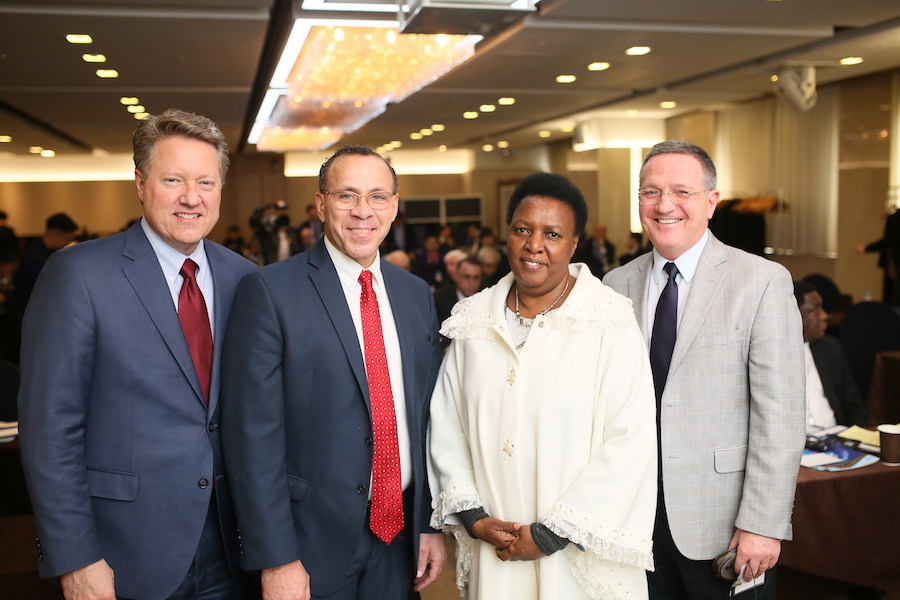
From left: Mr. Greg Mitchel, Rev. Dr. Paul Murray, Rev. Cannon Rosemary Mgobo, Dr. Brian J. Grim
Highlighting the essential principle of the freedom of thought, conscience, and religion in building any free and just society, the session on Religious Freedom acknowledged the universal human right enshrined in numerous international covenants and declarations, including the United Nations Universal Declaration of Human Rights and the UN International Covenant on Civil and Political Rights.
When we work together to advance religious freedom, we are highlighting a common ground, a “hallowed ground” that we have with all nations. Freedom of religion and thought is an extension of human dignity, upholding a high but universal standard. In a time where governments and systems have encroached upon these rights, interfaith leadership can call disparate communities to advocate for these rights in the public sphere. In affirming our fundamental human rights as well as our responsibilities, a virtuous and engaged citizenry can work to build ethical communities and prosperous societies.
“The grounds for fear are varied and many. In the hopeless crisis, uncertain decisions and perplexity, the greatest need for the world is for men and women who know, live, and communicate peace—an environment of hope and calmness.”
Rev. Cannon Rosemary Mgobo, from the Provincial Secretary of the Anglican Church of Kenya, stated, “The grounds for fear are varied and many. In the hopeless crisis, uncertain decisions and perplexity, the greatest need for the world is for men and women who know, live, and communicate peace – an environment of hope and calmness. This is an urgent demand not only from God, but from a mankind paralyzed in amazement by so many social, political, and economic crisis and disappointments.”
Brian Grim, President of the Religious Freedom & Business Foundation (RFBF), called on leaders from all sectors of society to ensure free societies do not revert back to oppression saying, “When we talk about religious freedom it is the idea of having religious diversity and inclusion. Nowadays, people start to look for new jobs if not supported by their companies, so it is a good time for business people to join the fight of religious freedom.”
Mr. Greg Mitchell, Co-Chair of International Religious Freedom Roundtable, explained the strategy of the Roundtable, a platform in Washington D.C. that has proven to bring people together—despite deep political and theological differences, to singularly focus on improving religious freedom around the world. This consistent gathering builds mutual understanding, respect, trust and reliance among groups, citizens and governments.
We believe that a global network of multi-faith Roundtables that intentionally interfaces across countries and continents…could support societies that are more civil, states that are more stable, and thus countries that are stronger. These civil society-led Roundtables are manifestations of “bottom-up” civil society engaging the “top-down” of governments, through which strategic partnerships and consultative relationships between governments and civil society organizations might advance peace and prosperity.
Advancing Religious Freedom for all Korean People
In the culminating session of the Values-based Peacebuilding Track, panelists focused on advancing religious freedom for all people through a focused study of religious freedom in the unique Korean context. Fundamental to the aspiration and ideals of the Korean people historically and today has been the essential principle of freedom of thought, conscience, and religion. These freedoms form the very core or foundation of one’s human dignity and yet are violently suppressed in North Korea. This session sought consensus around effective actions that South Korea and the international community could take to support greater freedom of faith and conscience for North Korean people.

From left: Shin-Sam Kang, Yeo-Sang Yoon, and Kenneth Bae
Moderator of the session, Professor Jin Shin, President of the Institute for Peace Affairs opened by encouraging the audience to “remind ourselves where we need to go these next 100 years. The unification we are pursuing needs to be based on basic freedoms with the spirit of the March 1st Movement.”
This session also drew on lessons from the March 1st Korean Independence movement as an important historical resource for advancing current efforts towards the same. The Korean Declaration of Independence issued on March 1, 1919 was the spark that ignited a peaceful dream for a united, free, and prosperous Korea. The independence leaders, a body of 33 Koreans who came from all walks of life and many different faiths, sacrificed their lives to proclaim a model nation around the principles of self-determination and independence.
The March First Movement did not result in an independent, united Korean nation at that time. However, as expressed through speakers like Shin-Sam Kang, President of Unification Academy, the spirit of peaceful reunification lives in grassroots efforts today in Korea and the diaspora around the world.
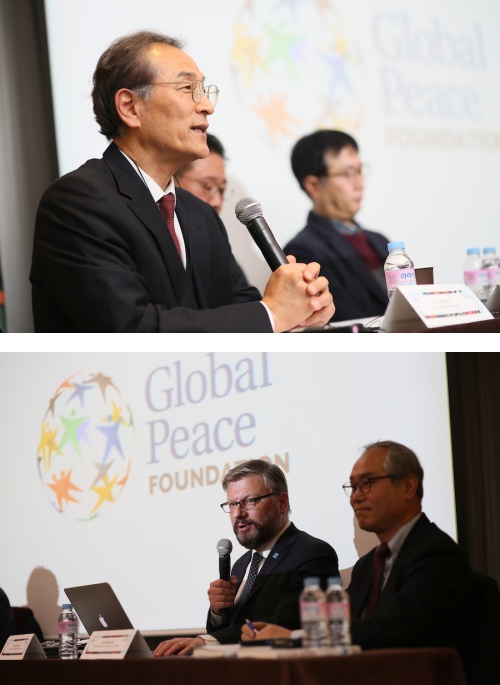
Above: Dr. Jin Shin; below: Greg Scarlatoiu
Greg Scarlatoiu, from The Committee for Human Rights In North Korea, called attention to the need to actively engage North Korean defectors and to protect their rights as an important part of the work of advancing religious freedom in the North. He warned, “The North Korean defectors should be continuously protected and their voices should be heard. In order to resolve political security issues, some governments may be tempted to lower the priority on human rights issues.”
Kenneth Bae shared from his own personal testimony of working and living in captivity in North Korea for practicing his religion. Rather than focusing only on what North Korea must do, he noted that there were steps that the international community could take to further religious freedom in North Korea. He noted, “A step that nations such as the United States could take is regarding economic sanctions. By stating that economic sanctions won’t be reduced if they don’t let North Korea have freedom of religion would pressure and achieve what we all strive for.”
Yeo Sang-yoon, President of the Database Center of North Korean Human Rights, shared on the nature of reality in North Korea saying, “Religion does exist in North Korea. But freedom of religion doesn’t. Religion and faith are there but there is a lot of persecution and pressure by the authorities.” Yet he encouraged that, “If we ask with a stronger voice, we will be heard.”
The Values-Based Peacebuilding and Religious Freedom sessions were part of the Global Peace Convention 2019 held in Seoul, South Korea on February 26-March 1 under the theme, “Korean Dream: Vision for a Unified Korea.” View the full gallery on Values-Based peacebuilding and sign up for monthly newsletters for the latest from Global Peace Foundation.

